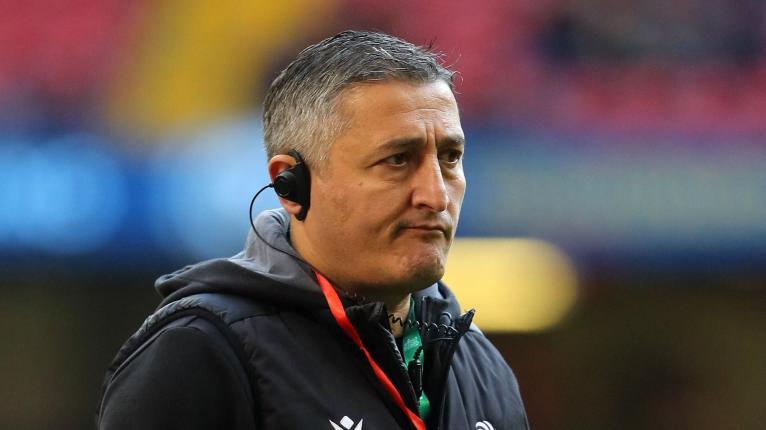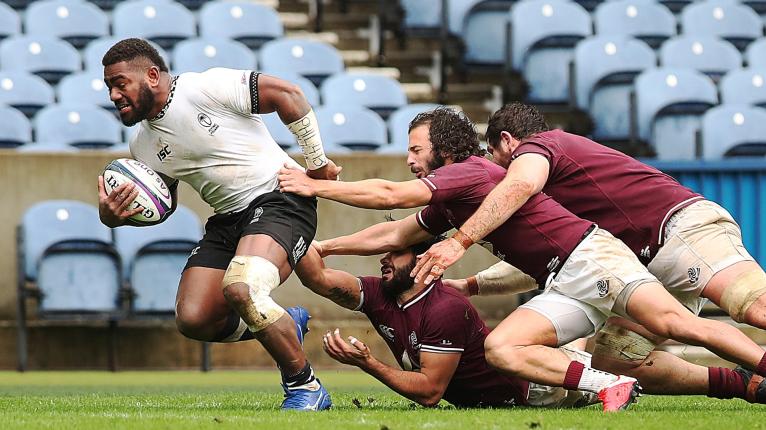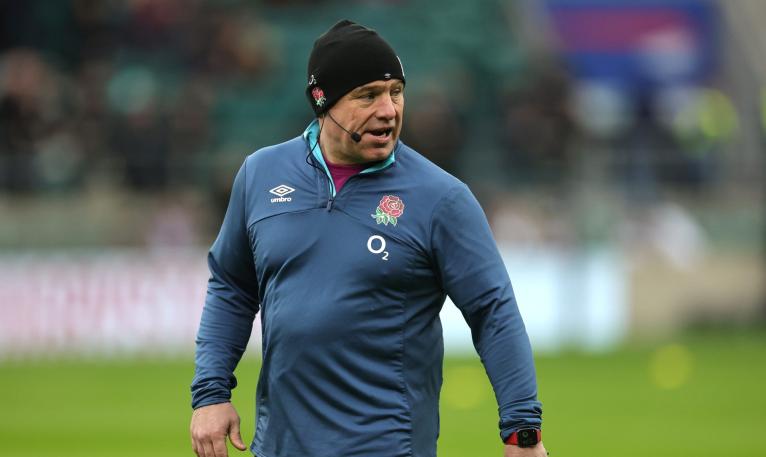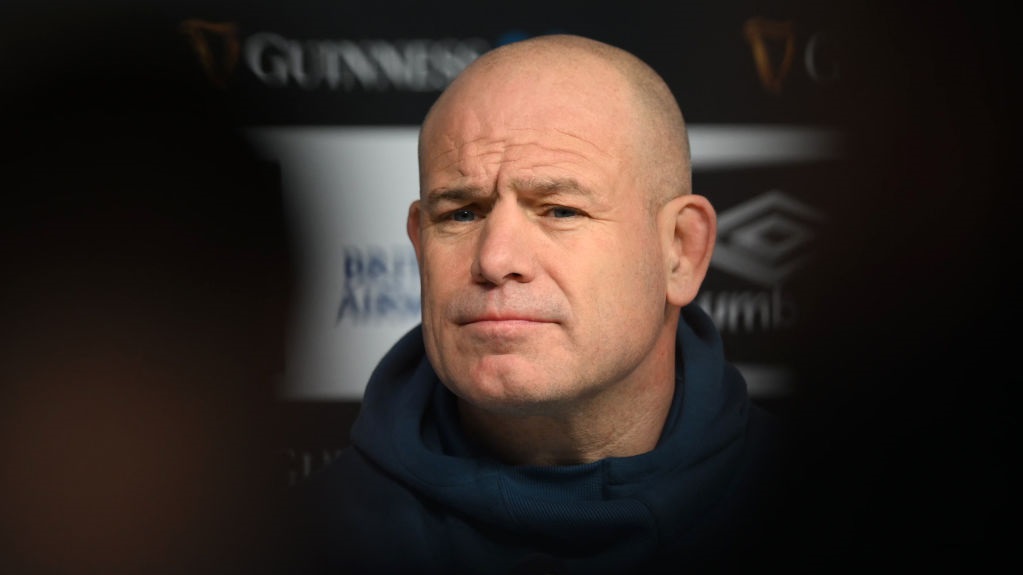Richard Cockerill: 'No one can still tell me what a tier one team is'

Richard Cockerill smiles when he playfully points out that he is the only head coach that England and Georgia have ever had with an unbeaten record. “Maybe it is time to retire from Test rugby!” he joked.
Cockerill was speaking to RugbyPass from Tbilisi, 11 days into his job as Levan Maisashvili’s successor in the Lelos hot seat – roughly half the time he spent in charge of England in an interim, bridging role that fell outside of the Test window, between Eddie Jones’ departure and Steve Borthwick’s arrival.
The former England and Leicester hooker has every right to be happy having landed a prestigious international job a matter of months after he was unceremoniously dumped seven games into the Top 14 season by impatient Montpellier owner, Mohed Altrad.
With his no-nonsense, warrior-like reputation, it’s easy to see Cockerill and Georgia’s tough-as-teak players as kindred spirits, and the fact that he speaks good French, the second language of many of the squad, will only help get his message across.
“I hope I am a good fit because of that (fighting) mentality but I think there is more to the team than that,” said the much-travelled Cockerill, who began his coaching career nearly two decades ago at Tigers, at a time when trophies regularly made their way back to Welford Road. “I am learning every day about the history of this country and it culture, it is vast and complicated and it is not that long ago, 20-odd years, that there was war here.
“We can use that history, as they do already, to really find a way of how Georgia play their rugby and how that resonates with their DNA and culture to make sure that every time we play, we represent the three and a million people that live here.”
Cockerill and his girlfriend are now part of that Georgian population having moved into an apartment in Vake, one of the poshest parts of town.
“Tbilisi has been a very pleasant surprise, it is a pretty cool place, so I am enjoying that, the city has a different vibe to it, it is very cosmopolitan, and it is very European for want of a better way of describing it, and good people who have a very earnest, earthy view of the game so I hope I am a good fit, I hope they have chosen well,” he said.
“The weather is a lot nicer than you would imagine and it’s pretty enjoyable to live here. It is not what us Brits think, if you’re uneducated like me, that if you get east of Italy it’s all a bit dodgy. The people have been great, very welcoming and straightforward, and I like that.”
Unlike other districts in Tbilisi, the area where Cockerill lives is almost completely flat (the name Vake means a ‘fallen’ or ‘low’ place), which is a good thing considering Cockerill is a keen road cyclist. In the Rugby Europe Championship though, the Lelos always command the high ground.
Georgia have won the last six titles, at a canter if truth be told, and there is a strong feeling that tougher tests are needed on a regular basis if they are to go one better than their current all-time best of 11th in the world rankings and break into the top 10 and be considered a tier one team.
“No one can still tell me what a tier one team is and what a tier 2 team is, everyone says we are a tier two team but I don’t know, do you have to be top 10 to be a tier one team or do you get given the status of being tier one?” questioned Cockerill.
“We want to compete with sides like Japan, Fiji and Italy, sides that are in around that top 10, and we have to have ambitions to break into that top 10.
“That is going to take a lot of hard work because we sit 14th in the world at the moment but there is a solid foundation and there is a good crop of young players coming through.
“We have got those the opportunity and develop them so that when we get to a World Cup in Australia we have got guys who now have two or three caps have 30 or 40 caps.”
Georgia have arranged a summer friendly against Japan, with another Test against a tier one team in the pipeline. But if the Lelos find themselves excluded from the imminent World League, such fixtures will be hard to come by other than at Rugby World Cups.
“I have only been here for a very short period of time but I think the feeling is we are still on the outside and not on the inside of the inner circle so to speak so we have got to make sure our results are good and we can compete in the Challenge Cup (with Black Lion) and the Rugby Europe Championship so that whatever gets created is in the future are part of that,” he said.

“For the moment, though, it looks as though whatever they have created from 2025/26, Georgia won’t be part of that.”
While that’s a major consideration for everyone involved in Georgian rugby moving forward, Cockerill’s foremost task is to prepare the team for the latest iteration of the Rugby Europe Championship.
Cockerill says he can’t wait “to get on the grass” and start working with the squad ahead of the defence of their title and build on what Maisashvili – who stays on board in Performance Director role – and Milton Haig before him, achieved in turning Georgia into one of the emerging powerhouses of the game.
He counts his blessings that the opportunity came around so quickly. “I have been very fortunate every time that I have managed to find myself out of work that I have been able to find work quickly enough. I chose to go to Montpellier because it was the right choice at the time and it turns out it wasn’t to be, but that’s life.
“I had an impromptu leave of absence from Montpellier and I got contacted by Georgia because I became available at the very last minute and we had discussions.
“The opportunity to come here and get straight back into coaching just feels the right thing to do. It is a prestigious job and it’s a great project.
“If you’re not in the top six or eight teams in the world, for me the next best job would be Georgia.
“From where Milton and Levan started to where they are now is unbelievable really, and I now have the responsibility to try push that a little but further.

“Levan has put in very solid foundations over the four years and there is going to have to be a bit of transition from the older players to the younger players for this cycle.
“I’ve been here a week and a half and I am looking forward to getting my feet on the grass and getting into coaching.”
Georgia begin their defence of the Rugby Europe Championship title on the 4th of February with a match against Germany in Dessau, a town known for its association with the Bauhaus art movement. It would take some abstract thinking, even in those surroundings, to imagine a scoreline anything but lopsided in favour of the visitors.
The Germany game and Georgia’s first home fixture against the Netherlands, a side coached by Lyn Jones, one of Cockerill’s old adversaries in the Anglo-Welsh Cup days, will be all about evolving the team ahead of bigger challenges.
While once it was Georgia’s props and hookers that were feted, now full-back Davit Niniashvili is the young man taking all the plaudits following a series of standout performances in France, both at the Rugby World Cup and also with Lyon in the Top 14.

And restoring Georgia’s reputation as one of the most feared scrums in the world is one Cockerill’s priorities after the Lelos pack fell short of expectations at Rugby World Cup 2023.
Cockerill, 53, a member of the multi-decorated Leicester ABC front-row Club, who once stared down the Haka in the white of England, looks to be as qualified as anyone to get them back to where they want to be, and he has added Conor McPhillips, the former Connacht and Bristol skills and backs coach to his team.
“The backline is pretty much intact, the backline had a great World Cup, there is a lot of threat and a lot of talent in the backline and some others to come through the age groups. Certainly in the back row we have a lot of strength but, post-World Cup, we have an ageing front five,” said Cockerill, England’s forwards coach under Eddie Jones for a year.

“There are some young guys we need to bring through, and we just need to try and make sure we are as dominant as we can be in the scrum, if that is possible in the modern game. The set piece parts, especially the scrum, weren’t as good at the World Cup as they would have liked.
“In the next four years we want to try and dominate the set piece again. By everyone’s admission, that has fallen away a little bit; the Georgian scrum hasn’t been the force it has been previously, and that’s a natural cycle, and the dynamics of the team have changed.”
Mikheil Nariashvili will be 34 in May and is unlikely to convert his 75 caps into a century, and 33-year-old hooker Shalva Mamukashvili is another nearer the end of his career than the start, so time dictates that there needs to be a changing of the guard.
Stade Francais loose-head Sergo Abramishvili and Grenoble tight-head Irakli Aptsiauri are a pair of 20-year-olds that Cockerill will hope to develop into the cornerstone of the Lelos pack.
Abramishvili has been a regular in the Top 14 this season and has three caps off the bench in last season’s Rugby Europe Championship, while Aptsiauri, who plays in ProD2, has appeared from the bench twice at Test level.
“I have got a lot of experience in playing and coaching in the front row, and I have coached some pretty decent guys in the front row before and there are some good guys here already that are senior players and there are guys who are 20/21 playing in France who will want to take their opportunity. I am looking forward to working with them for the first time.

“And in the second row, we need to decide what our second rows look like moving forward because we have got some older guys who may potentially make the World Cup but who will be moving into their mid-30s so we have to get the next generation coming through.
“We have to win now, because we are expected to win in the Rugby Europe Championship and the Super Cup, but we have to develop players at the same time which is always the holy grail as coaching.
“If I pick young guys and we lose, I am naïve, and if I pick old guys and we win, I should be developing the young guys. Either way, people will have an opinion.
“The reality is, as we have seen probably with this team, and probably with Italy previously, against the best teams you are just keeping the score down with set piece and slowing the game down. If you want to try and develop your game, you have to try and do both.
“We have a 3,5000 player pool. I worked in Scotland for a long time (with Edinburgh) and they complained they only had 50,000 and what have England got? Half a million or something. So we have got to make the best of everything.
“I have got a lot of experience and, hopefully I can impart that experience and make Georgian rugby stronger.”





































































“No one can still tell me what a tier one team is….”. When you routinely get comfortably beaten by Italy and they recently shipped the thick end of 100 points against the ABs you can safely assume you’re not one……
Hi Richard,
A tier one team is one that gets three votes in World Rugby council sessions.
Hope this helps.